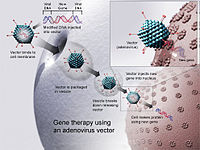
Photo from wikipedia
ABSTRACT Introduction: Gene therapy clinical trials with adeno-associated virus (AAV) vectors report impressive clinical efficacy data. Nevertheless, challenges have become apparent, such as the need for high vector doses and… Click to show full abstract
ABSTRACT Introduction: Gene therapy clinical trials with adeno-associated virus (AAV) vectors report impressive clinical efficacy data. Nevertheless, challenges have become apparent, such as the need for high vector doses and the induction of anti-AAV immune responses that cause the loss of vector-transduced hepatocytes. This fostered research focusing on development of next-generation AAV vectors capable of dealing with these hurdles. Areas Covered: While both the viral vector genome and the capsid are subjects to engineering, this review focuses on the latter. Specifically, we summarize the principles of capsid engineering strategies, and describe developments and applications of engineered capsid variants for liver-directed gene therapy. Expert Opinion: Capsid engineering is a promising strategy to significantly improve efficacy of the AAV vector system in clinical application. Reduction in vector dose will further improve vector safety, lower the risk of host immune responses and the cost of manufacturing. Capsid engineering is also expected to result in AAV vectors applicable to patients with preexisting immunity toward natural AAV serotypes.
Journal Title: Expert Opinion on Biological Therapy
Year Published: 2020
Link to full text (if available)
Share on Social Media: Sign Up to like & get
recommendations!